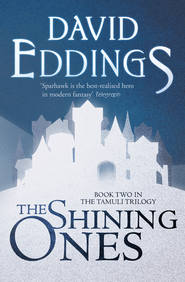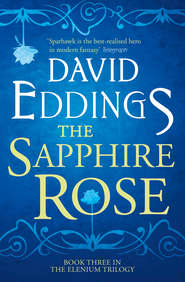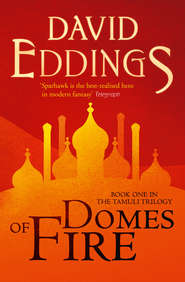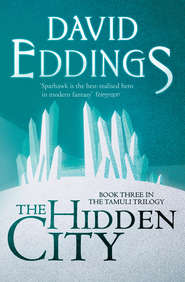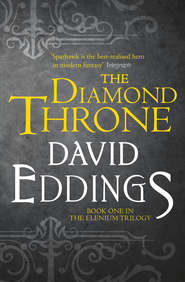По всем вопросам обращайтесь на: info@litportal.ru
(©) 2003-2025.
✖
Belgarath the Sorcerer and Polgara the Sorceress: 2-Book Collection
Автор
Год написания книги
2019
Настройки чтения
Размер шрифта
Высота строк
Поля
This is really amazing. I cannot believe that a wolf could live so long.’
‘Wolves live as long as they choose to live,’ she sniffed. ‘One would be more content with you if you would do something about your smell,’ she added.
You see, Polgara, you weren’t the first to make that observation.
It was several years later when I had occasion to change my form for some reason which I’ve long since forgotten. I can’t even remember what form I took, but I do remember that it was early summer, and the sun was streaming golden through the open window of my tower, bathing all the clutter of half-forgotten experiments and the heaps of books and scrolls piled against the walls in the pellucid light of that particular season. I’d thought that the wolf was asleep when I did it, but I probably should have known better. Nothing I did ever slipped past her.
She sat up with those golden eyes of hers glowing in the sunlight. ‘So that is how you do it,’ she said to me. ‘What a simple thing.’
And she promptly turned herself into a snowy white owl.
Chapter 9 (#ulink_d607f992-9bb8-59f7-a180-15e1a9d5ea37)
I knew little peace after that. I never knew when I turned around what might be staring at me – wolf or owl, bear or butterfly. She seemed to take great delight in startling me, but as time wore on more and more she appeared to me in the shape of an owl.
‘What is this thing about owls?’ I growled one day.
‘I like owls,’ she explained as if it were the simplest thing in the world. ‘During my first winter, when I was a young and foolish thing, I was chasing a rabbit, floundering around in the snow like a puppy, and a great white owl swooped down and snatched my rabbit almost out of my jaws. She carried it to a nearby tree and ate it, dropping the scraps to me. I thought at the time that it would be a fine thing to be an owl.’
‘Foolishness,’ I snorted.
‘Perhaps,’ she replied blandly, preening her tail feathers, ‘but it amuses me. It may be that one day a different shape will amuse me even more.’
Those of you who know my daughter will see how she came by her affinity for that particular shape. Neither Polgara nor my wife will tell me how they communicated with each other during those terrible years when I thought I’d lost Poledra forever, but they obviously did, and Poledra’s fondness for owls quite obviously rubbed off. But I’m getting ahead of myself here.
Things went along quietly in the Vale for the next several centuries. We’d set most of the things in motion that needed to be ready for us later, and now we were just marking time.
As I’d been almost sure that it would, Tol Nedrane had burned to the ground, and my badgering of that patriarch of the Honethite family finally paid off. One of his descendants, a minor public official at the time, had that affinity for masonry I’d so carefully bred into his family, and after he’d surveyed the ashes of the city, he persuaded the other city fathers that stone doesn’t burn quite as fast as logs and thatch. It’s heavier than wood, though, so before they could start erecting stone buildings, they had to fill in the marshy places on the island in the Nedrane. Over the shrill objections of the ferrymen, they built a couple of bridges, one to the south bank of the Nedrane and the other to the north one.
After they’d filled the swamps with rubble, they got down to business. To be quite honest about it, we didn’t care if the citizens of Tol Honeth lived in stone houses or in paper shacks. It was the work gangs that were important. They provided the basis for the legions, and we were going to need those legions later. Building stone is too heavy for one man to carry – unless he has the sort of advantages my brothers and I have. The standard work gang of ten men ultimately became the elemental squad. When they had to move larger stones, they’d combine into ten gangs of ten – the typical company. And when they had to install those huge foundation-blocks, they’d gather up a hundred gangs of ten – a legion, obviously. They had to learn how to cooperate with each other to get the job done, and they learned to take orders from their overseers. I’m sure you get the picture. My Honethite became the general foreman of the whole operation. I’m still sort of proud of him – even though he was a Honeth.
Tolnedra at that time was not nearly as civilized as it is now – if you can call Ce’Nedra civilized. There are always people in any society who’d rather take what they want from others than work for it, and Tolnedra was no exception. There were bands of marauding brigands out in the countryside, and when one of those bands attempted to cross the south bridge in order to loot Tol Nedrane, my stone-mason ordered his work gangs to drop their tools and take up their weapons. The rest, as they say, is history. My protégé immediately realized what he’d created, and the dream of empire was born.
After the Honethite stone-mason had extended his control of the surrounding countryside for about twenty leagues in all directions, he changed the name of his native city to Tol Honeth and dubbed himself ‘Ran Honeth I, Emperor of all Tolnedra’ – a slightly grandiose title for a man whose ‘empire’ was only about four hundred square leagues, I’ll grant you, but it was a start. I felt rather smug about the way it all turned out.
I didn’t have time to sit around congratulating myself, though, because it was about then that the Arendish civil wars broke out. I’d invested a lot of effort in Arendia, and I didn’t want those families I’d founded getting wiped out in the course of the festivities. The three major cities in Arendia, Vo Mimbre, Vo Wacune, and Vo Astur, had been established fairly early on, and each city, along with its surrounding territory, was ruled by a duke. I’m not certain that the idea of a single king would have occurred to the Arends if the example of the First Honethite Dynasty hadn’t existed to the south. It wasn’t until much later, however, that the Duke of Vo Astur formalized the internal conflict by proclaiming himself King of Arendia.
The informal civil war was trouble enough, though. I’d established families in each of the three duchies, and my major concern at the time was keeping them from encountering each other on the battlefield. If Mandorallen’s ancestor had killed Lelldorin’s, for example, I’d never have been able to make peace between the two of them.
To add to the confusion in Arendia, herds of Hrulgin and packs of Algroths periodically made forays into eastern Arendia to look for something – somebody – to eat. The Ulgos were down in the caves, so the favorite food of those monsters was in short supply in their home range.
I saw this at first hand once when I was supposedly guiding the Baron of Vo Mandor, Mandorallen’s ancestor, toward a battlefield. I didn’t want him to reach that field, so I was taking him the long way around. We were near the Ulgo frontier, when the Algroths attacked.
Mandorin, the baron, was a Mimbrate to the core, and he and his vassals were totally encased in armor, which protected them from the venomous claws of the Algroths.
Mandorin shouted the alarm to his vassals, clapped down his visor, set his lance, and charged.
Some traits breed very true.
Algroths’ courage is a reflection of the pack, not the individual, so when Mandorin and his cohorts began killing Algroths, the courage of the pack diminished. Finally, they ran back into the forest.
Mandorin was grinning broadly when he raised his visor. ‘A frolicsome encounter, Ancient Belgarath,’ he said gaily. ‘Their lack of spirit, however, hath deprived us of much entertainment.’
Arends!
‘You’d better pass along word of this incident, Mandorin,’ I told him. ‘Let everybody in Arendia know that the monsters of Ulgoland are coming down into this forest.’
‘I shall advise all of Mimbre,’ he promised. ‘The safety of the Wacites and Asturians doth not concern me.’
‘They’re your countrymen, Mandorin. That in itself should oblige you to warn them.’
‘They are mine enemies,’ he said stubbornly.
‘They’re still human. Decency alone should spur you to warn them, and you are a decent man.’
That got his attention. His face was troubled for a moment or so, but he finally came around. ‘It shall be as you say, Ancient One,’ he promised. Tt shall not truly be necessary, however.’
‘Oh?’
‘Once we have concluded our business with the Asturians, I shall myself, with some few companions, mount an expedition into the mountains of Ulgo. Methinks it will be no great chore to exterminate these troublesome creatures.’
Mandorallen himself would not have said it any differently.
It was about fifteen hundred years after the cracking of the world when Beldin came back from Mallorea to fill us in on Torak and his Angaraks. Belmakor left his entertainments in Maragor to join us, but there was still no sign of Belzedar.
We gathered in the Master’s tower and took our usual chairs. The fact that Belzedar’s chair was empty bothered us all, I think.
‘It was absolute chaos in Mallorea for a while,’ Beldin reported. ‘The Grolims from Mal Yaska were selecting their sacrificial victims almost exclusively from the officer corps of the army, and the Generals were arresting and executing every Grolim they could lay their hands on, charging them with all sorts of specious crimes. Finally Torak got wind of it, and he put a stop to it.’
‘Pity,’ Belmakor murmured. ‘What did he do?’
‘He summoned the military high command and the Grolim hierarchy to Cthol Mishrak and delivered an ultimatum. He told them that if they didn’t stop their secret little war, they could all just jolly well pick up and move to Cthol Mishrak where he could keep an eye on them. That got their immediate attention. They could live in at least semi-autonomy in Mal Zeth and Mal Yaska, and the climate in those two cities isn’t all that bad. Cthol Mishrak’s like a suburb of Hell. It’s on the southern edge of an arctic swamp, and it’s so far north that the days are only about two hours long in the winter time – if you can call what comes after dawn up there “day”. Torak’s put a perpetual cloud-bank over the place, so it never really gets light. “Cthol Mishrak” means “the City of Endless Night”, and that comes fairly close to describing it. The sun never touches the ground, so the only thing that grows around there is fungus.’
Beltira shuddered. ‘Why would he do that?’ he asked, his expression baffled.
Beldin shrugged. ‘Who knows why Torak does anything? He’s crazy. Maybe he’s trying to hide his face. I think that what finally brought the generals and the Grolims to heel, though, was the fact that the disciple Ctuchik runs things in Cthol Mishrak. I’ve met Urvon, and he can chill the blood of a snake just by looking at it. Ctuchik’s reputed to be even worse.’
‘Have you found out who the third disciple is yet?’ I asked.
Beldin shook his head. ‘Nobody’s willing to talk about him. I get the impression that he’s not an Angarak.’
‘That is very unlike my brother,’ Aldur mused. ‘Torak doth hold the other races of man in the profoundest of contempt.’
‘I could be wrong, Master,’ Beldin admitted, ‘but the Angaraks themselves seem to believe that he’s not one of them. Anyway, the threat of being required to return to Cthol Mishrak brought out the peaceful side of Urvon’s nature, and Urvon rules in Mal Yaska. He started making peace overtures to the generals almost immediately.’
‘Does Urvon really have that much autonomy?’ Belkira asked.
‘Up to a point, yes. Torak concentrates on the Orb and leaves the administrative details to his disciples. Ctuchik’s absolute master in Cthol Mishrak, and Urvon sits on a throne in Mal Yaska. He adores being adored. The only other power center in Angarak Mallorea is Mal Zeth. Logic suggests that Torak’s third disciple is there – probably working behind the scenes. Anyway, once Urvon and the generals declared peace on each other, Torak told them to behave themselves and sent them home. They hammered out the details later. The Grolims have absolute sway in Mal Yaska, and the generals in Mal Zeth. All the other towns and districts are ruled jointly. Neither side likes it very much, but they don’t have much choice.’







